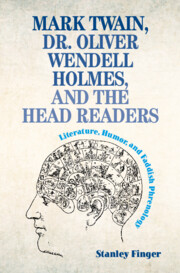 Mark Twain, Dr. Oliver Wendell Holmes, and the Head Readers
Mark Twain, Dr. Oliver Wendell Holmes, and the Head Readers Published online by Cambridge University Press: 17 April 2023
Americans first learned about Gall’s doctrine from reviews in British periodicals and physicians returning from France, where Gall and Spurzheim had settled. After Spurzheim split from Gall in 1813 and began lecturing throughout Britain and publishing books in English, they learned more. Spurzheim made some modifications and began to call the doctrine “phrenology,” while still retaining craniological correlations as the primary method. He attracted many people to it, as did his Scottish disciple, George Combe, who started the first phrenological society and journal, emphasizing how it could be used to lead to happier, healthier lives and promote institutional reforms. In 1832, Spurzheim came to America but died in Boston that year, drawing more attention to phrenology. Soon after, Orson and Lorenzo Fowler formed a business reading heads and selling all things phrenological, including books, journals, charts, and specimens. The Fowlers were masterful at promoting phrenology. Although Gall had focused on phrenology as a science, phrenology now became synonymous with head readings, thanks in part to the Fowlers and their associates. In this era with little in the way of new research to support phrenological assertions, head readings became faddish among the laity.
To save this book to your Kindle, first ensure [email protected] is added to your Approved Personal Document E-mail List under your Personal Document Settings on the Manage Your Content and Devices page of your Amazon account. Then enter the ‘name’ part of your Kindle email address below. Find out more about saving to your Kindle.
Note you can select to save to either the @free.kindle.com or @kindle.com variations. ‘@free.kindle.com’ emails are free but can only be saved to your device when it is connected to wi-fi. ‘@kindle.com’ emails can be delivered even when you are not connected to wi-fi, but note that service fees apply.
Find out more about the Kindle Personal Document Service.
To save content items to your account, please confirm that you agree to abide by our usage policies. If this is the first time you use this feature, you will be asked to authorise Cambridge Core to connect with your account. Find out more about saving content to Dropbox.
To save content items to your account, please confirm that you agree to abide by our usage policies. If this is the first time you use this feature, you will be asked to authorise Cambridge Core to connect with your account. Find out more about saving content to Google Drive.